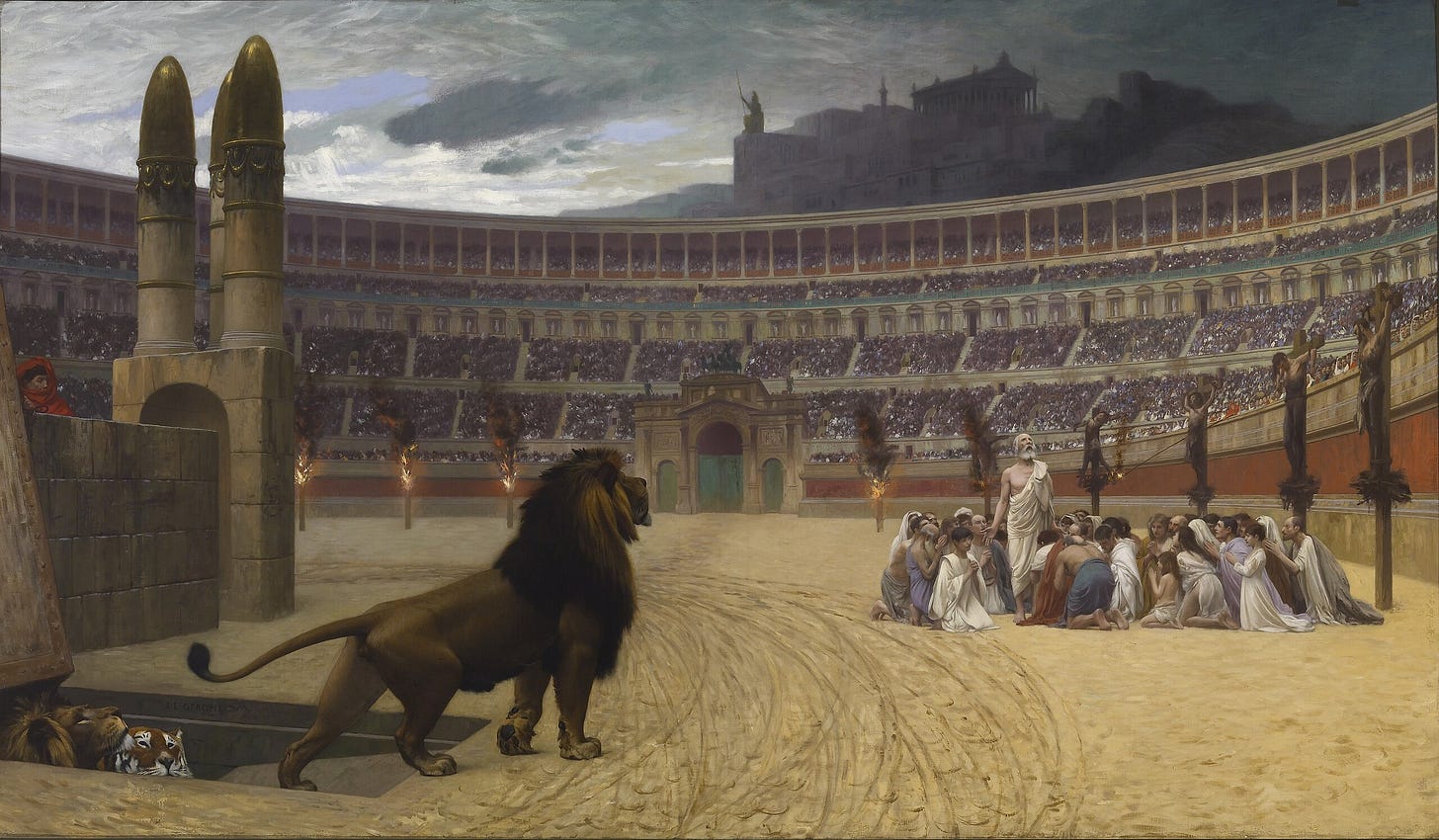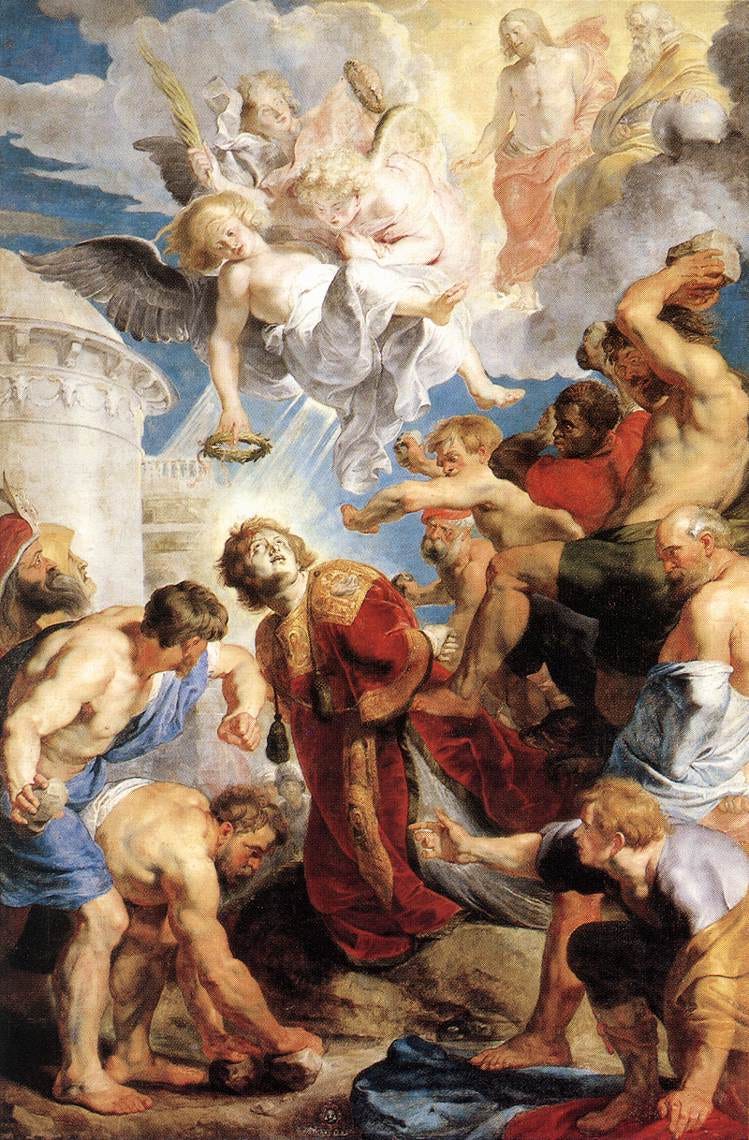On Charlie Kirk: Seeds of Perseverance in a Divided Time
How the Martyr’s Blood Hardens Some in Rebellion but Multiplies the Church in Faith
On September 10, 2025, Charlie Kirk was shot in cold blood during his American Comeback Tour, mid-sentence in a debate with students, before a packed audience that included his wife and children. In the gruesome chaos, his young daughter broke into a panic and tried to run toward her father, only to be held back as medics and security rushed to his side. He was transported to a trauma center and fought for his life. But the wound proved mortal, and he succumbed to it later that day.
The reaction was as divided as the man himself. Many mourned the loss of an outspoken Christian and free-speech advocate. Yet others—across the political aisle, and even among supposed moderates—defended his killer, with some going so far as to openly celebrate the assassination. Major outlets, from ABC to CNN, sought to soften or spin the narrative, straining credibility with implausible tales of a “tragic love story” gone wrong, even as it emerged that the assailant with a variety of extreme fetishes—ranging from bestial to cannibalistic—was a self-described anti-fascist defender of trans ideology.
The blood of martyrs has always been a dividing line. When a Christian is slain, the world doesn’t respond with neutrality. Some recoil with contempt, sneering at faith and celebrating death. Others, pierced by the same event, are strangely drawn toward the cross. In one case, the heart hardens against God in judgment; in the other, the heart is steeled by God for perseverance.
This paradox has pressed upon us again in the wake of Charlie Kirk’s assassination. The cultural response has been revealing: memes and mockery on one side, sorrow and renewed devotion on the other. The same sun that melts wax hardens clay. The same martyrdom that confirms unbelievers in their rebellion strengthens believers in their resolve.
Scripture names both realities. Pharaoh’s heart was hardened against God’s word (Exod. 9:12), a judgment by which he was “given over” to the stubbornness he had chosen (Rom. 1:24). Yet elsewhere, trials are said to produce endurance, character, and hope (Rom. 5:3–5). What damns the wicked fortifies the saints. What confirms rebels in sin also preserves the faithful in grace.
Paradoxically, persecution not only purges but multiplies the Church. Far from being a dead end, martyrdom serves as an instrument of God’s providence. It hardens some hearts into perdition and others into perseverance—and through it, God gathers His elect and displays the victory of Christ.
For those anxious about the future of Christianity in America, this paradox isn’t a cause for despair, but for hope. The apparent defeat of the Church may yet be the seed of her renewal, something many of us have already begun to witness as unfamiliar faces filled our pews this past Lord’s Day.
I. The Hardening of Judgment
Scripture is unflinching about the nature of unbelief: when men reject God, they don’t remain neutral. Their hearts calcify against His truth. In Exodus, Pharaoh’s heart was hardened again and again—sometimes attributed to Pharaoh himself (Exod. 8:15), sometimes to God’s judicial act (Exod. 9:12). The lesson, in either case, remains clear: persistent refusal to heed God’s word results in a divine handing-over. The very rebellion Pharaoh chose became the condition he could no longer escape.
Paul describes the same reality in Romans 1. Three times he repeats that God “gave them up” (vv. 24, 26, 28)—a chilling refrain that signals not divine neglect, but divine judgment. To be abandoned to one’s own sin is itself the punishment. As Augustine observed, “That which is called God’s hardening is His judgment by which He deserts and doesn’t soften.” In other words, when men persist in unbelief, God gives them exactly what they want: a hardened heart, seared conscience, and darkened mind.
We see this dynamic at work in our own day. The assassination of a Christian figure hasn’t only revealed hatred of the man, but contempt for the faith he professed. Rather than lamenting the taking of life, many mocked it, even celebrated it. This is nothing new: the psalmist Asaph describes those who “set their mouths against the heavens, and their tongue struts through the earth” (Ps. 73:9). What once was whispered in secret now parades as virtue in the open square.
Such responses aren’t merely unfortunate reactions; they are signs of judgment. When the murder of a believer is turned into entertainment, it reveals the hardening of hearts long closed to truth. Like Pharaoh, the mockers aren’t softened by the witness of God’s people but are further confirmed in rebellion. Martyrdom, which should awaken conscience, becomes instead the occasion for ridicule.
This is the hardening of judgment. It’s what happens when men, confronted with the blood that cries out, choose to close their ears. This tragedy encompasses more than the fact that they kill the righteous. In so doing, they wound themselves, sinking deeper into the blindness they have already embraced.
II. The Hardening of Perseverance
If judgment hardens the hearts of the wicked, grace hardens the hearts of the saints—but in a different way. Not into rebellion, but into resolve. Not closed against God, but open to and fortified by His Spirit to endure. Scripture consistently testifies that trials, far from destroying the Church, are the means by which God strengthens it.
Paul tells the Romans that “suffering produces endurance, and endurance produces character, and character produces hope, and hope does not put us to shame” (Rom. 5:3–5). James echoes the same: “the testing of your faith produces steadfastness” (James 1:3). The Spirit doesn’t allow persecution to end in despair, but transfigures it into perseverance. The same fire that consumes dross purifies gold.
The blood of martyrs, therefore, isn’t wasted. Jesus Himself taught, “Unless a grain of wheat falls into the earth and dies, it remains alone; but if it dies, it bears much fruit” (John 12:24). Herein lies the mystery of martyrdom: death becomes the seed of life, defeat becomes the seed of victory. Tertullian’s dictum—“the blood of the martyrs is the seed of the Church”—wasn’t just rhetoric but historical observation. From the amphitheaters of Rome to the gulags of the Soviet Union, persecution has often swelled rather than silenced the ranks of believers. And today, in places like China and Iran, Christianity is among the fastest-growing faiths despite widespread persecution.
The Reformers read this not as accident, but as providence. Calvin observed that God “so tempers His judgments as to turn the malice of the wicked into the constancy of His children.” What the world intends for destruction, God ordains for preservation. The apparent loss of a martyr becomes the means of strengthening the faith of thousands. Their blood isn’t simply shed; it’s sown.
This is what might be called the “hardening of perseverance.” The Spirit steels the heart of the church so that it doesn’t crumble under hatred but grows more resolute. The eyes of unbelievers, too, are opened by such witness. As in Acts, where the scattered Church only carried the gospel farther (Acts 8:1–4), so persecution today becomes an instrument of regeneration—the martyr’s cry a summons to wandering sheep.
Far from signaling Christianity’s decline in America, moments like these may be the very instruments God uses to awaken His people and gather His elect. What looks like the world’s triumph often proves to be Christ’s advance.
III. Hope for the Church in America
To look at the present moment with merely human eyes is to see cause for discouragement. Church attendance has been shrinking in many places. Cultural elites often mock the faith. Younger generations, catechized by secular ideologies, increasingly view Christianity as a relic to be discarded. And now, the assassination of Charlie Kirk has revealed just how calloused public sentiment can be. One could be forgiven for wondering whether Christianity in America is headed toward irrelevance, if not extinction.
Yet this perspective misunderstands the way God works. The Church has never advanced by cultural approval or political favor, but by the sovereign hand of Christ who rules from heaven. “I will build my church,” Jesus declared, “and the gates of hell shall not prevail against it” (Matt. 16:18). That promise didn’t depend on Caesar’s tolerance, nor does it depend on America’s. The future of Christianity here doesn’t rest on whether our neighbors applaud us or our laws protect us. It rests upon the risen Christ, who holds the keys of death and Hades (Rev. 1:18).
Indeed, it’s often in times of loss, persecution, and death that the Church has grown most vibrantly. When Stephen was stoned, Luke tells us, “there arose on that day a great persecution against the church in Jerusalem, and they were all scattered” (Acts 8:1). To outward sight, this looked like defeat. Yet in the very next verse we read that “those who were scattered went about preaching the word” (Acts 8:4). What seemed like destruction was in fact the engine of expansion.
Church history is filled with this pattern. The Roman emperors sought to crush Christianity by spectacle, burning saints as torches and casting them to wild beasts. Instead, the sight of Christians dying with hymns on their lips brought conversions by the thousands. Augustine later reflected that Rome “was conquered by the martyrs more than by the legions.” Centuries later, the Marian persecutions in England had the opposite effect of what their architects intended: the courage of Ridley, Latimer, and Cranmer at the stake fanned the flames of the English Reformation. What rulers meant for suppression, God ordained for reformation.
This providential principle applies no less to our own day. If God allows opposition to rise in America—whether in ridicule, exclusion, or even violence—it won’t be to extinguish His people but to refine them. Persecution is never pleasant, but it’s always purposeful. As Peter exhorted suffering Christians, “In this you rejoice, though now for a little while, if necessary, you have been grieved by various trials, so that the tested genuineness of your faith—more precious than gold that perishes though it is tested by fire—may be found to result in praise and glory and honor at the revelation of Jesus Christ” (1 Pet. 1:6–7). The fire of trial is the forge of perseverance.
This means the present moment, far from being a cause for panic, may be God’s appointed instrument of renewal. If American Christianity has grown comfortable, divided, or lukewarm, persecution may be the very medicine by which Christ restores vigor to His body. The Church doesn’t survive by avoiding the cross but by bearing it. And every time the world believes it has silenced a Christian witness with blood, God raises ten more in his place.
For that reason, we needn’t despair over the future of Christianity in America. The signs of renewal are already visible. Even in the wake of Charlie Kirk’s death, many congregations found their pews filled with new faces this past Lord’s Day—souls stirred to seek what the world cannot give.
The paradox of martyrdom is stark but simple: the same event that hardens some into rebellion hardens others into perseverance. To the world, it’s the stench of death; to the Church, the aroma of life (2 Cor. 2:16). Pharaoh’s heart was hardened unto judgment, but the saints’ hearts are hardened unto endurance.
Charlie Kirk’s death won’t be neutral in its effect. For some, it will confirm unbelief and mockery. For others, it will awaken faith and courage. By the Spirit, martyrdom becomes not an end but an instrument—the plow that breaks the soil, the seed that falls into the ground to bear fruit, the witness that calls sinners to repentance and saints to steadfastness.
This is why Christians cannot despair over the future of the Church in America. God has never preserved His people by shielding them from the cross. He preserves them through it. The blood of martyrs won’t silence the Church; it steels her voice instead. It doesn’t thin the pews; it fills them. And it doesn’t mark the failure of Christ’s kingdom, but its advance.
So when we see blood spilled, we grieve, but we don’t lose hope. For even in death, Christ is gathering His elect, purifying His bride, and reminding us that the gates of hell will never prevail against His Church. The blood cries out—and heaven answers with life.
Thanks for reading! If you believe the West is worth saving, then The Oak Remains is for you.
I write to uncover truth, restore forgotten foundations, and chart a way forward through faith, history, and first principles.
Want to support this work directly? Buy me a coffee or consider upgrading your subscription to help keep the lamp lit.





